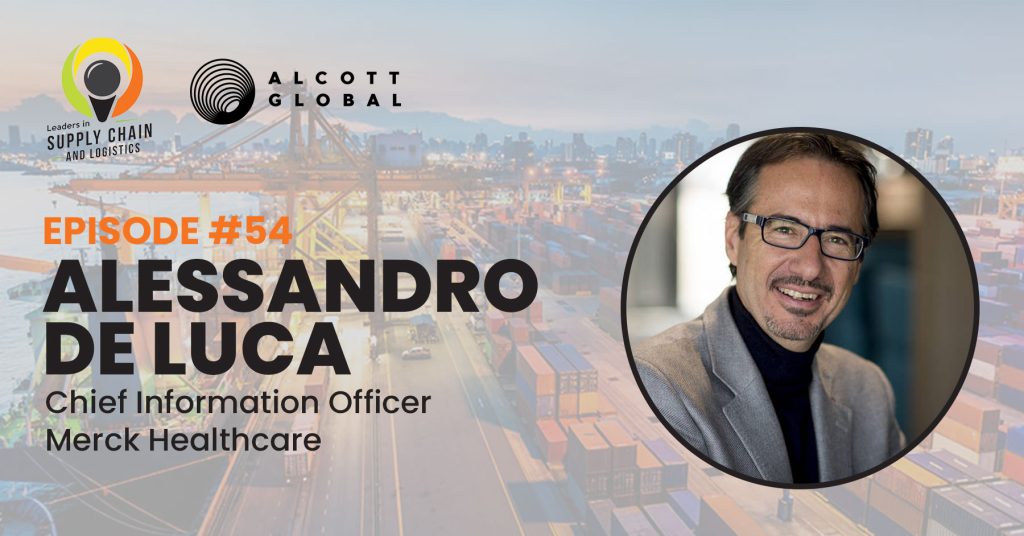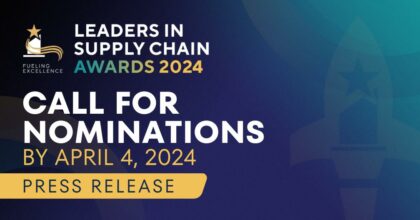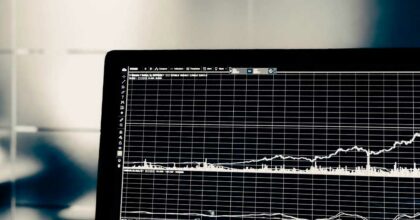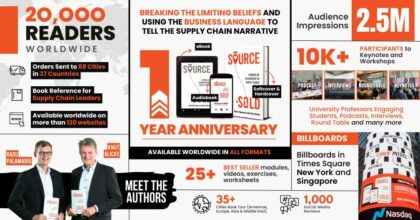Alessandro is the Chief Information Officer for Merck Healthcare. One of the largest healthcare groups in the world.
In 2016, he has been elected “The Inspirational Leader of the Year” within the Merck BioPharma division.
In 2015, he has been awarded the Nr 1 Pharma “Most Influential Supply Chain Executive in Europe” (among the top 5 across all industries) by the SCM magazine.
Previously to his Pharma supply chain experience, he worked in Procter & Gamble (FMCG’s industry) for 20 years holding positions across Innovation & Marketing, Manufacturing, Engineering, and Supply Chain Management. He has operated in countries such as China, Russia, Venezuela, Spain, and several Eastern European countries.
Listen to the full discussion here:
- Stream by clicking here.
- Download as an MP3 here.
Connect with the Guest:
Alessandro de Luca: Linkedin | Company Website
Some of the highlights from the podcast:
- Transitioning from FMCG to Healthcare. And from Supply Chain to being a CIO
- Merck and self-driving supply chain
- Learn fast, fail fast, and try fast
- Ecommerce in healthcare and its growth
- Ensuring traceability through IoT and blockchain – are we there yet?
- What are the two elements key to digital transformation success
- Skills needed in the future
Show notes:
- [01:18] Tell us a little about your transition from the supply chain to a CIO role.
- [02:19] “If there is something that I would say is that I would recommend to anybody who works in business to have a development opportunity in the digital world, whatever their role is and then come back to the business or vice versa.”
- [03:56] “We need business people that embrace and learn the technological world so that the technological and digital world can really serve and accelerate business lines.”
- [06:21] How far away are you at Merck in terms of having the self-driving supply chain?
- [07:51] “With this self-driving supply chain, the system ran continuously, so it’s doing an MRP run every 30 seconds and so on. So far it’s like having the engine of your car continuously updating the data.”
- [08:49] “Our mantra is that we don’t want the demand forecasting done by the human being.”
- [10:39] “The technology is advancing so much and that it creates new challenges even more.”
- [11:54] Tell us the technological differences and challenges for each business unit from a supply chain and IT perspective.
- [13:33] “All our discussion and pre-implementations were all about technological challenges to face. After the implementation and after being quite successful into it we discuss together what were the learnings of that implementation.”
- [14:40] “It took us six to eight months to master the accuracy that would enable the system to run perfectly smooth.”
- [16:00] “Mastering that accuracy and change management of people is the key to success.”
- [17:31] “We defer the use of technology according to the business needs because the three different sectors may have a different business need or a different requirement to win in the marketplace.”
- [18:12] Can you give us some examples of where you’ve come into play and enable the business to be closer to your clients from a CIO perspective?
- [19:11] “We successfully implemented and rollout globally a system that is called a patient support system that enabled us to provide our patients with the service, which they call ‘beyond and above the pill’ ”.
- [21:40] What kind of capabilities and characteristics are you looking for in your partners on the supply chain or logistics side to best support what Merck is doing?
- [22:13] “To solve these similarities and differences is to intimately collaborate to, to drive common solution.”
- [23:17] “So a collaborative tailor-made solution is one of the characteristics that we are looking within our partners and within our solution provider and so on.”
- [25:31] Somebody said, “learn fast, fail fast, try fast” and it is the exact philosophy that we are trying to adopt. I mean let’s learn as much as we can; let’s try as much as we can, and let’s accept that not everything should be perfect and sometimes we make mistake.
- [26:18] How does e-commerce play into how you do business today? How does that impact your supply chain?
- [27:49] “E-commerce in the business and in the supply chain is really playing a significant role. I mean when I visited our sector in light science we have more than 1 billion sales through our e-commerce platform.”
- [29:00] “The reason behind the success of Amazon and Alibaba is that the customers can easily choose whatever they want and get the product to their home in the shortest possible time.”
- [31:08] How do you look at the element of safety compliance and traceability?
- [33:43] Technology will be there to help us and for that to be possible we need to have the mindset that we can indeed get the same level of quality, safety, and legal requirement.
- [36:28] How much do you use IoT and Blockchain? Do you see them practical enough at this moment in time? Or maybe in the future?
- [39:21] “What we are trying to do with blockchain is to try, learn and adapt. Because it is all about learning, failing, testing again and layering. So blockchain for us is a milestone to the future of the supply chain.”
- [41:20] We implemented augmented reality because it enabled us to keep the manufacturing up and running while training our operator our radar with these glasses to maintain a safe environment.
- [43:17] How do you make both your models work? Do you ultimately want to remove all middlemen?
- [45:11] I truly believe that the right model is the mixed model. Leveraging one, the type of medicine that we have to distribute and two, the type of infrastructure that they cease in the marketplace.
- [47:42] What went through your mind in terms of your key drivers and key fears that pushed you to make these changes in your career?
- [48:09] I truly believe that continuous learning enables you to motivate because learning means being able to develop yourself either personally or professionally. And it also enables you to connect different dots.
- [50:42] My fear was not to become myself in love with the technology per se and that I will lose what I bring which is the fresh perspective to embrace it.
- [51:52] How would you respond to people saying, ‘what if I make this move and then I fail and then it doesn’t work out?’
- [52:51] If you want to maintain your competitive advantage as an individual, you have to keep learning, keep trying, keep failing and learning again.
- [54:41] What do you see as hard skills and soft skills that people need a lot and there’s not enough in the market now? What will be needed even more in the next five years?
- [55:57] We need digital supply chain architects because we hold new systems and we need somebody that understands and architect the solution and know-how of the function.
- [57:54] I still believe that there are lots of tactical people that are very good operationally but very few that really see the supply chain strategy for their own term.
About the Host:
The host, Radu Palamariu is the co-author of “From Source to Sold – Stories of Leadership in Supply Chain”. He has been named one of the top 3 Global Supply Chain Influencers on LinkedIn and was featured in Forbes, Bloomberg, WEF, Bangkok Post, and MIT Supply Chain Talent magazine. Radu invites executives to share stories and perspectives around technology, logistics, e-commerce, supply chain, and manufacturing, and their views on how the future will look.
Alcott Global connects and upgrades the supply chain ecosystem by finding the right talent through executive search, developing talent through learning solutions, and meeting supply chain technology needs through a comprehensive crunch base marketplace.
The supply chain executive search has been our focus since the very beginning, offering recruitment services for top-tier supply chain roles at every level of the end-to-end supply chain: plan, source / procure, make, and deliver. Our consultants have years of experience in placing top talent, in North America, LATAM, Europe, the Middle East & Africa, and APAC, and besides speed, one of our biggest strengths is our network within the supply chain industry, and we capitalize on it to find the best solutions.
Through the years, we have grown as an organization and our offerings with it. One of our initiatives, the learning solutions- training and supply chain academy, is focused on transforming leadership- self-leadership, executive presence, influence capital, and business acumen. Through Supplify, we aim to match corporations with the top technology companies to solve their supply chain and logistics challenges with a focus on innovation and digital transformation.
We are in constant touch with the leaders in supply chain, inviting them to inspire the supply chain professionals in thought-provoking podcast episodes and events, and showcasing what is possible at the yearly Leaders in Supply Chain Awards.
Related Episodes:
Episode #22: Sanne Manders COO of Flexport
Episode #39: Richard White CEO of WiseTech Global and CargoWise
Episode #53: Parag Khanna Founder & Managing Partner of FutureMap








